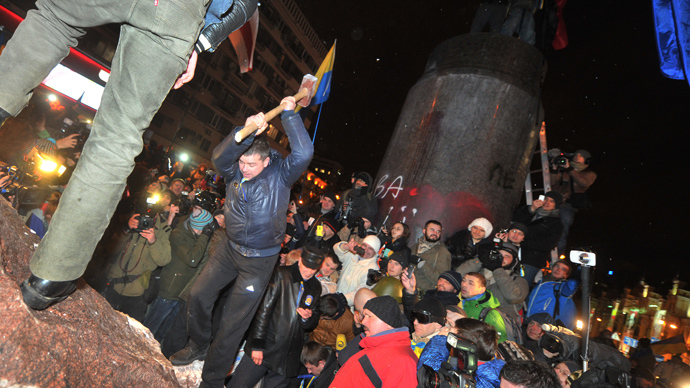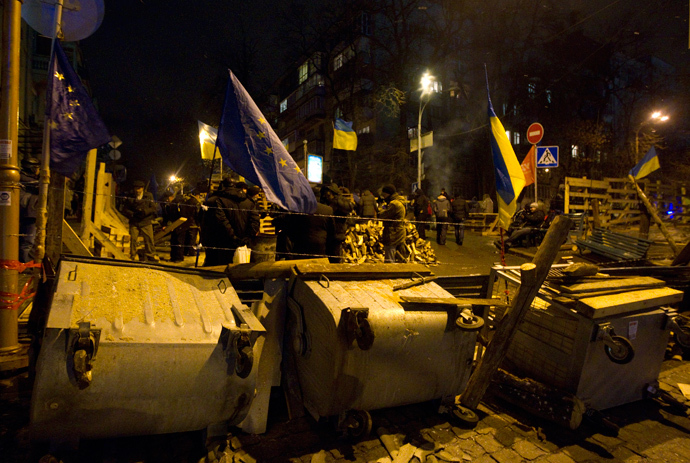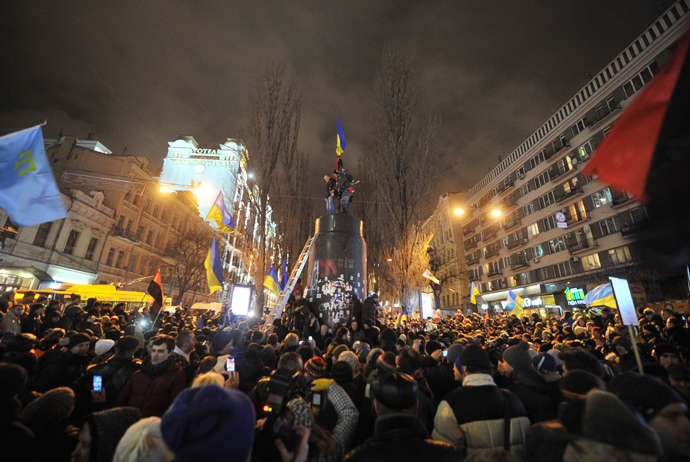'Parade of losers': EU delegation to Kiev threatens democracy

Far from promoting EU values and democracy the European delegation to Ukraine threatens democratic process, Professor Mark Almond told RT in his extensive analysis of the events in Kiev.
RT:The German chancellor and the French
foreign minister say they want to meet with Ukrainian opposition
leader Vitaly Klitschko - and support his presidential ambitions.
Do they see an exit for Yanukovich as a done deed, then?
Mark Almond: Well I think they hope so, and I think this
is what is deeply problematic because in addition to the double
standards that the EU leaders are showing when very little has
taken place in Kiev that could remotely justify foreign
intervention there. There have been no deaths. There have been a
few heads hit with truncheons. But when we think about the deaths
that took place in other countries where the European leaders
ignored or even colluded with regimes that did this - Egypt for
instance this summer, when perhaps 1,000 people were killed -
it’s very striking the double standards and I think this is also
a threat to our democracy domestically.
In the EU countries, if crowds on the street are to determine that the government that may be unpopular in the midterm should fall, where does that stop? If that crowd is stimulated with foreign support, foreign cash; I’m afraid to say that in my misspent youth I use to help take money and computers and all sorts of equipment to dissidents in Eastern Europe, so I know that perhaps the fairytale picture of just the people rising up rather looks how the people were stimulated to rise up, how there is a media campaign, how there is support base system that requires money for instance. And that comes I am afraid from the EU countries, in major part.

RT:Several EU officials are supporting the anti-government rallies in Ukraine - but shouldn't they be focusing on problems closer to home - with the major protests we've been witnessing in Greece, Spain and Italy?
MA: First of all that would admit that a lot of policies they support, and policies by the way they wish to impose on Ukraine, very stringent austerity policies, hikes in the price of gas, electricity and so on, 40 percent, that those are deeply unpopular inside Europe and they are in a sense saying that we are representing some kind of ideals abroad in Ukraine. And I think again, this is again, it’s double standards.
Hypocrisy of course is terribly displeasing, but it also masks this problem of contempt for the ordinary people. Because once you’d say that what should determine who rules is the crowd in the street, not the ballot box, then of course, in almost any society there are reasons why 50-70,000 people might be discontent with the government, might go into the streets if they get sympathetic coverage in the media, you could inflate the numbers to hundreds of thousands. But even hundreds of thousands are only a small number in a country of 46 million people. And I think whether it is Ukraine today, whether it could be Italy or Spain tomorrow, once you start saying that the ballot box can be trumped by the street that is a deep threat to democracy. Far from promoting EU values and democracy and the rule of law, we seem to be able to throw them out the window in order to get our man into power.
RT:The EU failed to convince Yanukovich that the trade deal was good for Ukraine... In backing the protesters, are they hoping to undermine his government?
MA: I think there is an attempt through a rumor mill to create a heightened sense of tension and alarm. Those who remember the so-called Orange Revolution in 2004 will remember we were told then that there were Russian Spetznaz special force lurking in the woods near in Kiev waiting to crack down. They weren’t. Nothing happened. In fact Mr. Yanukovich accepted what could be regarded as a kind of electorate coup de tat then, when after all pressure was put to re-stage the elections. So if anything, his credentials of being a person willing to accept the electorate process are better than his opponents, who have always cried foul when they’ve lost and tried to get foreign support to reverse the election results.

RT:EU officials say they support the democratic aspirations of the Ukrainian people - but what we're seeing are vandalism and squatting in administrative buildings - is that democracy?
MA: So we are seeing a kind of propaganda war, psychological war taking place using these rumors of both the crackdown domestically and even foreign interference. Whilst at the same time, the very Western media and Western governments who report these rumors completely ignore the evidence of their own involvement in supporting the opposition, providing technical training camps, providing financial and other forms of assistance, providing a media platform for them.
Of course one has to say that although there was a relatively large crowd in the Kiev today, it was far below the demand for a million people. Well below: probably 150,000. So there is a body of activists but it does not seem yet to have attracted even a significant body or majority support in Kiev, let along in the wider country which remains remarkably passive, in fact. Of course the average person in Ukraine, I’m afraid to say, has considerable economic difficulties, has reasons to be thinking ahead preparing for the winter, preparing to deal with the problems of electricity and gas bills, which incidentally of course will be massively raised if the policy promoted by the West is adopted, the policy demanded by the IMF actually wants a 40 percent increase in those electricity and gas bills. I find it quite extraordinary that that issue is not asked about when Westerwelle, the German foreign minister, and Fabius, the French foreign minister, and so on address these questions. How are ordinary Ukrainians to deal with the European values they’ve been asked to subscribe too, which actually involves them committing economic suicide?
RT:Is Ukraine really the priority for the EU here - or is it just being used as a pawn in a bigger game?
MA: Well first of all we see a parade of losers coming to Kiev. Westerwelle, the German foreign minister’s party was annihilated in the recent German election. It’s lost all of its seats. Kaczyński the former Polish prime minister is a loser. Saakashvili , the [former] president of Georgia reviled by the population for his brutality and torture in his prisons are coming because it gives them a sense of self importance. But also they are coming because the European power centers, the organization in Brussels, NATO and so on, see Ukraine as a key strategic factor.
They want Ukraine to be under their thumb, under NATO's thumb, because they are deeply hostile to Russia. And they don’t want to accept, of course in Ukraine there are diverse range of opinions of people that are pro-Russian, people who are anti-Russian. But Ukraine happens to sit next to Russia as well as to Poland. And instead they want to draw it into the Western sphere of influence. And I’m afraid, these retired, failed politicians are being presented to the public, Westerwelle, Saakashvili and so on, as representatives of the enormously rich and powerful West. So it’s slightly intimidating in fact if you are a person in a country that’s not terribly rich, not terribly powerful to suddenly have a collective bate of the NATO/EU countries bearing down on you and sort of saying, you must behave and you must adopt these policies.
Even though, in fact nobody voted in the election, that were only last year in 2012-nobody voted on the proposals that are now supposed to be at the center of this crisis. This was very secret. Nobody was told what they were. I suspect that the average person in Ukraine knows very little of what the so-called Association Agreement involved. But it is being pushed back by rhetoric about "Do you want to join the rich and affluent West?" The implication being that the rich and affluent West and the Europeans will pay for you, but we know they won’t pay for the Greek health service, they won’t pay for the Spanish health service. So why should they pay for the welfare of Ukrainians? I think it is rather misleading and cynical propaganda campaign sadly is being staged. But I think that many Ukrainians seem to be rather immune to it. Fortunately.
The statements, views and opinions expressed in this column are solely those of the author and do not necessarily represent those of RT.












